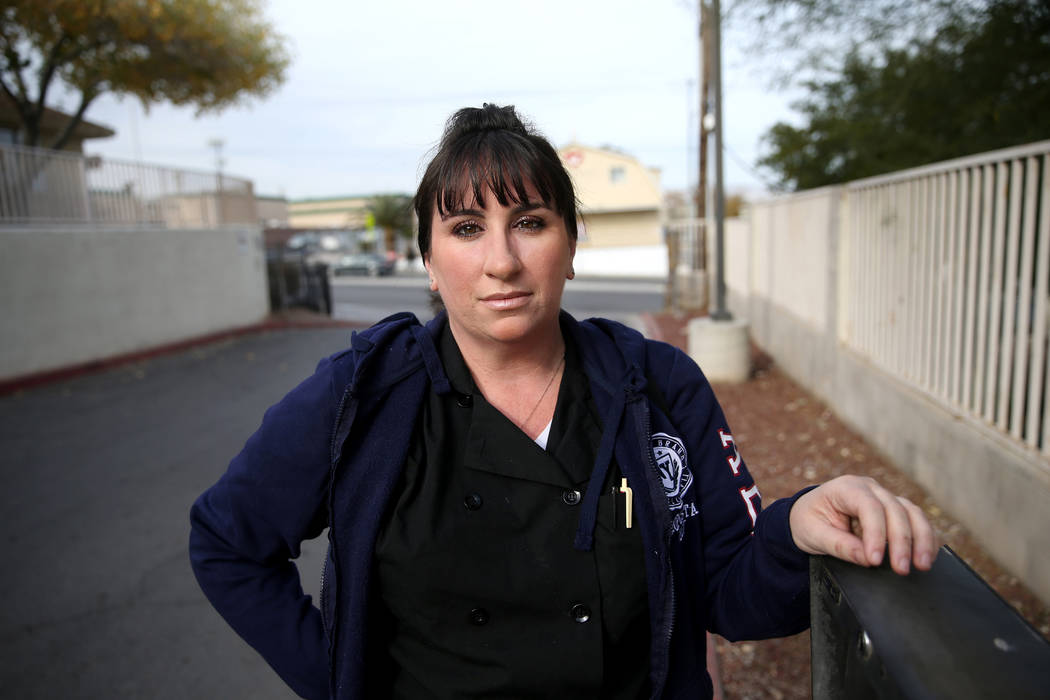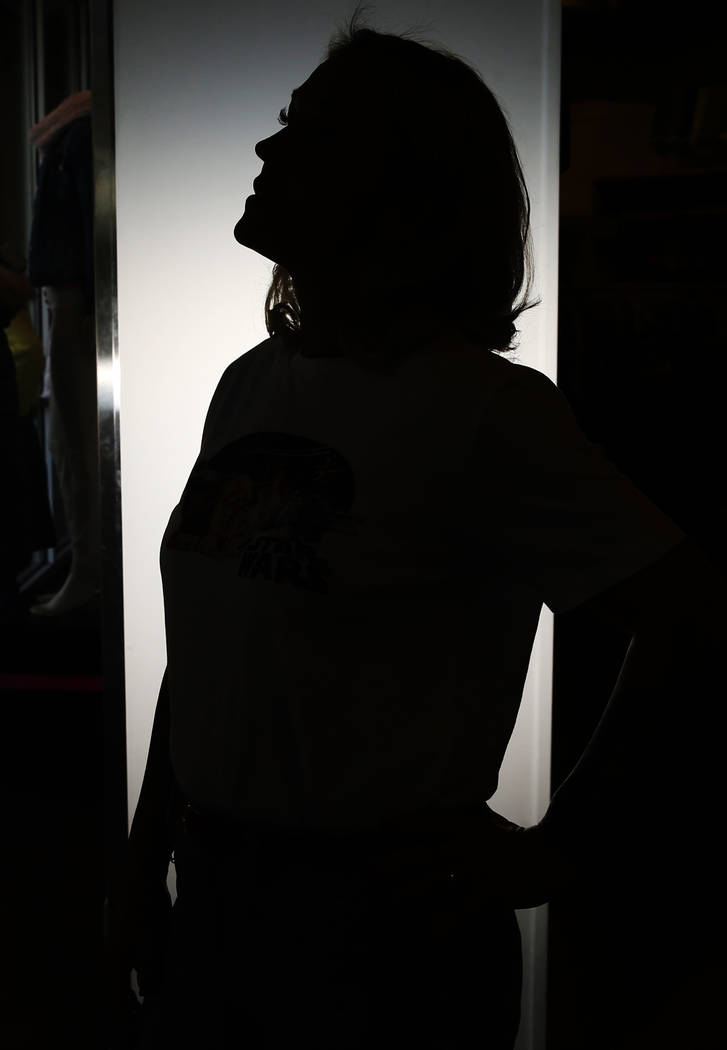Sex trafficking survivors thrive in new Las Vegas environment
Heather McGonigle says sex trafficking often stems from strip clubs and the porn industry.
She would know. That’s how she was lured in.
While she was stripping in her hometown of Bradenton, Florida, then-27-year-old McGonigle was grappling with what she called a functioning addiction to cocaine and heroin. She was addicted, but she could still work and lead a mostly normal life.
But after a while, she started to notice some of the other girls at the club going on “dates” with customers and going to after-parties to make a little extra money.
“I was like, ‘Let me get in on this,’” McGonigle said. “It starts off as glamorous. Then before you know it, you’re on the street selling yourself for $10.”
She said she fell into “the lifestyle” quickly, and it took her nearly a decade to get back out. She was arrested dozens of times and spent most of the past 10 years in and out of jail on drug and prostitution charges, giving birth to two of her three children behind bars. Now, she’s a 37-year-old pantry chef on the Strip who recently picked up her first one-year sobriety chip.
What saved McGonigle’s life, she said, was Refuge for Women Las Vegas. Now she wants to return the favor.
A long-term solution
Refuge for Women is a national organization designed to help survivors of sex trafficking. Robin Smith, city director for the Las Vegas branch, says the organization takes a unique approach. Rather than giving women a basket of food and maybe a night or two in a shelter, it takes women in for nine months to two years.
Refuge for Women has five houses across the country, and it never leaves survivors in the city they came from, Smith said. It moves them states away so they won’t fall back into their old routine on the streets they’ve been working for years.
The nonprofit is fully funded by donations and uses that money for housekeeping and payment for survivors’ flights, dental work, medical treatments and more.
“Our program is up to two years that the women can live for free and go through our program to help them get therapy, get counseling, get those life skills they don’t have,” Smith said. “We help them get jobs. We cross the gamut of what they need to be sustainable.”
Smith said 13 women have graduated from the Las Vegas branch since it opened in 2015.
Law enforcement assistance
The Metropolitan Police Department has a human trafficking task force that includes the department’s vice unit; law enforcement agencies at the local, state and federal levels; Refuge for Women, the Rape Crisis Center, Seeds of Hope and a network of survivors who meet monthly to discuss how best to assist human trafficking survivors in the valley.
Four times a year, the task force hosts a public forum, where it offers educational information, including how to recognize signs of trafficking and what resources there are for survivors. The next meeting will take place at 1 p.m. on Jan. 21 at Metro headquarters, 400 S. Martin Luther King Blvd.
Victim advocate Elynne Greene said it’s not uncommon for women and girls to be trafficked through brothels in smaller counties where prostitution is legal, then brought to Las Vegas when big events are hosted in town.
Greene said one of the most effective ways to combat sex trafficking is to get rid of misleading imagery and false statistics.
“When she hasn’t been bound and gagged and she hasn’t been chained up and kept in a closet, the question that people ask is, ‘Why didn’t you leave?’” Greene said. “And that’s not the case because they are chained, but it’s an emotional chain that’s even more powerful.”
Hotel raid in Texas
Christa Wagner, now 37, said she fell into sex trafficking when she was 17, after she got a fake ID to work at a strip club in her Texas hometown. She said her experience was similar to McGonigle’s. It started with stripping and soon turned into sleeping with customers to fund a crippling heroin addiction.
Off and on over the course of two decades, she was trafficked by a boyfriend and had to sell herself to pay for her next hit. She was forced by a man she loved and who she thought loved her, she said.
As Wagner tells it, you have to get high with the wrong guy only once to get sucked into the world of human trafficking.
But when police raided the La Quinta hotel where they were staying in Texas, Wagner’s trafficker was busted. Wagner was taken into an interrogation room and thought she was going to be arrested, but the hotel manager told police she had witnessed the man verbally and physically abusing her, so the police let her go.
The problem was she had nowhere to go.
A victims advocate heard about the La Quinta raid and connected Wagner with Refuge for Women. They found an open space for her at the house in Las Vegas and asked if she could get on a plane the next day.
On April 25, 2017, Wagner arrived in Las Vegas and met Smith, who was running the women’s house at the time.
Smith was the woman who would ultimately change her life.
Turning point
Smith said the cross-country move is often a deciding factor for the survivors and a way for the organization to tell if the women are truly ready to move on and start over with a clean slate. McGonigle said she’d cheated her way through multiple short-term recovery programs over the years, and it wasn’t until she hit rock bottom that she decided to take it seriously.
“I was handcuffed in the back of a cop car again, and I just gave it all up to God,” McGonigle said. “I prayed and asked for help and said I was going to do whatever it took to turn my life around.”
She found an organization in Bradenton called Selah Freedom, which referred her to Refuge for Women.
McGonigle said that when she arrived in Las Vegas, she saw one of the women she had gotten high with hundreds of times on the streets of Florida, but the woman wasn’t in the program. She was running it. She was in a leadership position helping women like herself, and McGonigle said that was the moment she knew she could change her own life.
“We sat there and we cried together because we were on the streets together,” McGonigle said. “So I was like, ‘Dude, this is where you’ve been? This is so awesome. I want this.’”
Three tiers to success
After faking her way through classes in past programs only to return to the Florida streets, McGonigle was moved by Refuge to Las Vegas to live with five other survivors and embark on a three-tiered program.
The first tier focuses on healing, getting the women into a daily routine of family meals in the house, counseling, recovery meetings, devotionals, recreational activities and more.
The second tier focuses on life skills and employment, showing the survivors how they can pursue an education or a career. The women take classes to learn skills including preparing a resume, practicing mock interviews and financial planning.
The third tier is optional and takes place after survivors graduate from the initial nine-month program. Graduates have the option to move into a transitional house, where they have more freedom to start their lives.
Smith said most women in the transitional program have jobs and take care of making their own appointments and covering their own finances, but they still have people in the home holding them accountable.
Hope for the future
Both McGonigle and Wagner have graduated from Refuge for Women and started their new lives in Las Vegas.
They both stay involved with the organization and work to raise awareness about the nonprofit, especially for Human Trafficking Awareness Month in January.
Wagner is married and working as a survivor advocate at Refuge for Women, determined to help others find a success story like her own. She often goes home to Texas to visit her children, who are living with her parents.
She said she’s worked hard to rekindle relationships with her sons and talks to them on the phone frequently.
McGonigle graduated from culinary school and works as a pantry chef at a successful restaurant. Her children are back in Florida, and though she doesn’t feel ready to return to her hometown yet, this is the first year she’s been able to get them Christmas presents.
She said she’s still in contact with her mentors at Refuge for Women and the women who lived in the house with her.
“I’m just so blessed to have had that opportunity at Refuge,” McGonigle said. “It changed my whole life.”
This story has been updated to clarify the length of time Wagner was trafficked.
Contact Alexis Egeland at aegeland@reviewjournal.com or 702-383-0335. Follow @alexis_egeland on Twitter.
To find help
If you or someone you know is being trafficked, call the National Human Trafficking Hotline at 888-373-7888 or text "HELP" or "INFO" to 233733.


















